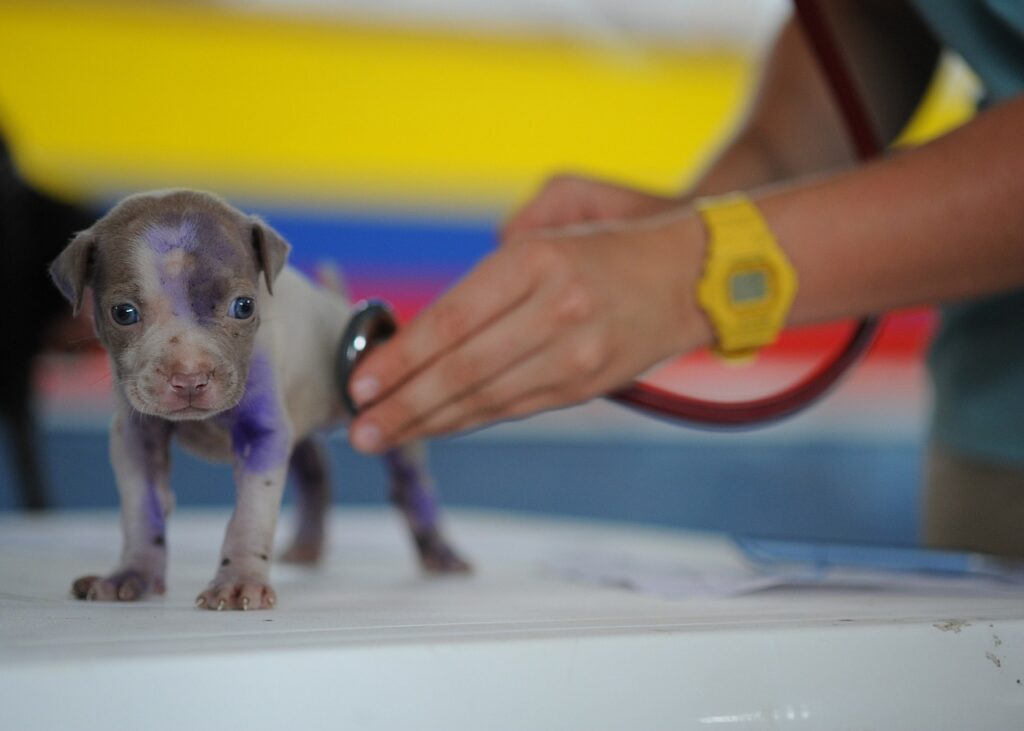Veterinary technician specialties play a vital role in animal healthcare, as they allow vet techs to focus on specific areas of expertise. By pursuing a specialization, vet techs can enhance their job prospects and potentially earn higher salaries. As the field of veterinary medicine continues to evolve, there are numerous specialties available for veterinary technicians to explore and master.

San Juan College
Veterinary Technology Degree (Online), AAS
Anesthesia and Analgesia Vet Technician
Anesthesia technicians play a pivotal role in veterinary medicine, as they ensure the safe administration and monitoring of anesthesia during surgical procedures. Their expertise allows veterinarians to perform surgeries with minimal discomfort for the animals and reduced risks of complications.
Those interested in specializing in anesthesia and analgesia can pursue certification through the Academy of Veterinary Technicians in Anesthesia and Analgesia (AVTAA). This organization sets the standards for education, training, and examination requirements, helping veterinary technicians to develop the necessary skills and knowledge to excel in this vital specialty.
- Nature of Work: Anesthesia and analgesia vet techs assist with administering anesthesia and managing pain in animals undergoing surgical or medical procedures.
- Job Responsibilities: They monitor patients under anesthesia, administer medications, and assist with pain management protocols.
- Required Skills: Knowledge of anesthesia protocols, ability to monitor vital signs, strong attention to detail.
- Potential Career Paths: Anesthesia and analgesia vet techs can work in veterinary clinics, animal hospitals, research facilities, or specialty anesthesia practices.

Mercy University
BS in Veterinary Technology Program
Location: Florida
Veterinary Dental Technicians
Dental technicians specialize in the essential aspects of animal oral health, such as dental cleanings, extractions, and oral surgeries. These professionals work closely with veterinarians to ensure the overall health and well-being of animals by maintaining their dental hygiene and addressing any oral health issues that may arise.
For those interested in pursuing this specialty, the Academy of Veterinary Dental Technicians (AVDT) provides certification and sets the requirements for education, training, and examination. By achieving certification through the AVDT, dental technicians demonstrate their commitment to excellence in the field of veterinary dentistry.
- Nature of Work: Dental technicians assist with dental cleanings, oral surgeries, and dental radiography.
- Job Responsibilities: They perform dental cleanings, take dental X-rays, and assist with dental surgeries and procedures.
- Required Skills: Knowledge of dental anatomy and procedures, ability to handle dental equipment, strong attention to detail.
- Potential Career Paths: Dental technicians can work in veterinary clinics, animal hospitals, or specialty veterinary dental practices.
Emergency and Critical Care for Animals
Emergency and critical care veterinary technicians excel in fast-paced environments, providing life-saving support to animals in need. These professionals often deal with urgent cases, trauma, and other emergencies, requiring them to think quickly and act decisively to ensure the best possible outcomes for their patients.
To become specialized in emergency and critical care, vet techs can seek certification through the Academy of Veterinary Emergency and Critical Care Technicians (AVECCT). This organization establishes the requirements for education, training, and examination, ensuring that certified technicians possess the skills and knowledge necessary to excel in high-stress veterinary situations.
- Nature of Work: Emergency and critical care vet techs work in emergency settings, providing immediate care to animals in critical condition.
- Job Responsibilities: They triage incoming patients, administer emergency treatments, and monitor patients in critical condition.
- Required Skills: Ability to work under pressure, knowledge of emergency protocols, strong communication skills.
- Potential Career Paths: Emergency and critical care vet techs can work in emergency clinics, specialty hospitals, or as part of mobile emergency response teams.

Animal Behavior Technicians
Behavior technicians play a crucial role in veterinary medicine by assisting with behavior modification and training for animals. Through their expertise, they help address behavioral issues, promote positive interactions between animals and their owners, and contribute to the overall well-being of pets.
For veterinary technicians interested in specializing in animal behavior, the Academy of Veterinary Behavior Technicians (AVBT) offers certification and sets the requirements for education, training, and examination. By obtaining certification through the AVBT, behavior technicians showcase their dedication to improving the lives of animals and their owners through effective behavior management.
- Nature of Work: Behavior technicians work with animals exhibiting behavioral issues, helping to diagnose and develop treatment plans to address these issues.
- Job Responsibilities: They conduct behavior assessments, develop behavior modification plans, and provide training and support to pet owners.
- Required Skills: Knowledge of animal behavior, ability to develop and implement behavior modification plans, strong communication skills.
- Potential Career Paths: Behavior technicians can work in veterinary clinics, animal shelters, training facilities, or behavior consulting practices.

Vet Tech Institute
Associate of Applied Science Degree in Veterinary Technology
Locations: Texas, Indiana, Illinois, Pennsylvannia
Internal Medicine Vet Tech
Internal Medicine is another popular veterinary technician specialty, with sub-specialties such as cardiology, neurology, and oncology. Technicians who pursue these sub-specialties must complete training and certification requirements specific to their area of expertise.
- Nature of Work: Internal medicine vet techs assist with diagnosing and treating diseases of the internal organs, such as the kidneys, liver, and lungs.
- Job Responsibilities: They assist with diagnostic procedures, administer treatments, and monitor patients with chronic or complex medical conditions.
- Required Skills: Knowledge of internal medicine procedures, ability to interpret diagnostic tests, strong attention to detail.
- Potential Career Paths: Internal medicine vet techs can work in specialty veterinary hospitals, research facilities, or academic institutions.

Pima Medical Institute
Veterinary Technician Associate Degree Program
Locations: California and Arizona
Zoological Medicine
Zoological Medicine veterinary technicians receive comprehensive training in all aspects of zoological medicine. These technicians must also meet training and certification requirements, ensuring they can provide specialized care to a wide range of animals in zoological settings.
- Nature of Work: Zoological medicine vet techs assist with the care and treatment of exotic and zoo animals.
- Job Responsibilities: They assist with medical procedures, handle and restrain exotic animals, and monitor the health and well-being of zoo animals.
- Required Skills: Knowledge of exotic animal care, ability to handle and restrain large and potentially dangerous animals, strong attention to detail.
- Potential Career Paths: Zoological medicine vet techs can work in zoos, aquariums, wildlife rehabilitation centers, or research facilities focusing on exotic species.
Surgical Technicians
Surgical technicians assist veterinarians during surgical procedures, ensuring that the surgical suite is prepared and that instruments and equipment are sterile.
- Nature of Work: Surgical technicians assist veterinarians during surgical procedures, ensuring that the surgical suite is prepared and that instruments and equipment are sterile.
- Job Responsibilities: They prepare surgical instruments and equipment, assist with patient preparation and monitoring during surgery, and maintain sterile conditions in the operating room.
- Required Skills: Knowledge of surgical procedures, attention to detail, ability to work well under pressure.
- Potential Career Paths: Surgical technicians can work in veterinary clinics, animal hospitals, research facilities, or specialty surgical centers.

Blue Ridge Community College
Veterinary Technology Associate of Applied Science (A.A.S.)
Location: Virginia
Clinical Pathology Technician
Clinical Pathology Technicians in this specialty perform laboratory tests on blood, urine, and other samples to assist in diagnosing diseases.
- Nature of Work: Clinical pathology technicians perform laboratory tests on blood, urine, and other samples to assist in diagnosing diseases.
- Job Responsibilities: They prepare samples for analysis, operate laboratory equipment, and analyze test results.
- Required Skills: Knowledge of laboratory procedures, attention to detail, ability to work accurately and efficiently.
- Potential Career Paths: Clinical pathology technicians can work in veterinary clinics, animal hospitals, diagnostic laboratories, or research facilities.
Equine Technician
Equine technicians specialize in the care and treatment of horses, assisting with medical and surgical procedures specific to equine medicine.
- Nature of Work: Equine technicians specialize in the care and treatment of horses, assisting with medical and surgical procedures specific to equine medicine.
- Job Responsibilities: They provide routine care for horses, assist veterinarians with examinations and treatments, and may provide support during surgeries.
- Required Skills: Knowledge of equine anatomy and physiology, handling and restraining large animals, strong attention to detail.
- Potential Career Paths: Equine technicians can work in equine veterinary clinics, horse breeding facilities, racetracks, or equestrian centers.

Colorado Academy of Veterinary Technology (CAVT)
Associate in Applied Science degree in Veterinary Technology
Location: Colorado
Clinical Nutrition Technician
Clinical Nutrition Technicians specialize in animal nutrition, providing dietary recommendations and developing feeding plans for animals with specific nutritional needs.
- Nature of Work: Clinical nutrition technicians focus on animal nutrition, providing dietary recommendations and developing feeding plans for animals with specific nutritional needs.
- Job Responsibilities: They assess the nutritional needs of animals, educate pet owners about proper nutrition, and monitor the progress of animals on specialized diets.
- Required Skills: Strong understanding of animal nutrition, excellent communication skills, and attention to detail.
- Potential Career Paths: Clinical nutrition technicians can work in veterinary clinics, animal hospitals, pet food companies, or animal nutrition research facilities.

Northcentral Technical College
Veterinary Technician Associate Degree
Locations: Wisconsin
NAVTA and CVTS: Guiding the Path for Veterinary Technician Specialization
The National Association of Veterinary Technicians in America (NAVTA) Committee on Veterinary Technician Specialties (CVTS) plays a significant role in guiding aspiring specialists. The CVTS offers guidelines and assistance for societies interested in attaining academy status, ensuring that the education and training provided by these academies meet the highest standards. Moreover, the CVTS is recognized by the American Veterinary Medical Association (AVMA), further validating the importance of its role in the veterinary profession.
The Veterinary Technician Specialist (VTS) or Veterinary Nurse Specialist (VNS) logo, which can be used by individuals certified by a NAVTA-approved academy, serves as an indicator of their expertise in their respective specialty area. This distinction helps veterinary professionals showcase their commitment to excellence and specialized knowledge in their chosen field.
Reaping the Rewards of Veterinary Technician Specialization
Specializing in a specific area of veterinary medicine offers numerous benefits for veterinary technicians. By working closely with veterinarians to provide specialized care, vet techs can have a more significant impact on animal health and welfare. Additionally, specialized veterinary technicians often enjoy increased job prospects and higher salaries due to their advanced knowledge and skills in their chosen field.
Furthermore, pursuing specialization contributes to personal and professional growth. Veterinary technicians who invest in continuing education and specialization can stay up-to-date with the latest developments in their field, ensuring they remain valuable assets to their employers and the veterinary profession as a whole.

LaGuardia Community College
Veterinary Technology, AAS
How to Choose a Vet Technician Speciality
Research Different Specialties
Start by researching the various veterinary technician specialties available. Look into the nature of the work, job responsibilities, required skills, and potential career paths for each specialty.
Assess Your Interests and Skills
Consider your interests, strengths, and skills. Think about which aspects of veterinary medicine you are most passionate about and where your strengths lie. For example, if you enjoy working with animals in critical condition, you might consider a specialty in emergency and critical care.
Consider Your Career Goals
Think about your long-term career goals. Consider how each specialty aligns with your goals and aspirations. Some specialties may offer more opportunities for advancement or specialization than others.
Evaluate Program Requirements
Review the requirements for each specialty program, including any additional education, training, or certification needed. Consider whether you are willing and able to commit to the additional requirements.
Seek Advice from Professionals
Talk to veterinary technicians and other professionals in the field to gain insights into different specialties. They can provide valuable advice based on their experiences and help you make an informed decision.
Gain Experience
Consider gaining hands-on experience in different areas of veterinary medicine through internships, volunteer work, or job shadowing. This can help you get a feel for different specialties and determine which one is the best fit for you.
Make a Decision
Once you have gathered all the necessary information, make a decision based on what aligns best with your interests, skills, and career goals.
Remember that your choice of specialty is not set in stone, and you can always change specialties or pursue additional training later in your career if you find that your interests shift.

Central Coast College
AAS Degree in Veterinary Technology
Location: California
Unlocking Career Potential with Pathways to Advancement
For adult learners and non-traditional students seeking a fulfilling career in veterinary medicine, Pathways to Advancement offers an online education solution tailored to meet their unique needs. With a focus on lifelong learning and personal growth, Pathways to Advancement provides unbiased advice from education and career experts, ensuring that students receive the guidance they need to succeed in their chosen field.
By covering a wide range of careers and industries, including veterinary technician specialties, Pathways to Advancement empowers students to explore various opportunities and discover their ideal career path. This comprehensive approach helps students develop the skills and knowledge required to excel in their chosen profession and achieve their career goals.
Embark on Your Veterinary Specialization Journey
The world of veterinary technician specialties is vast and diverse, offering rewarding career paths for those who choose to pursue them. By specializing, veterinary technicians can work closely with veterinarians to provide specialized care, enjoy increased job prospects, and experience personal and professional growth. To begin your journey towards specialization and advance your veterinary career, visit Pathways to Advancement for valuable resources and guidance tailored to your unique career goals.
Resources For Veterinary Technician Specialists
Academy of Veterinary Emergency and Critical Care Technicians: https://www.avtaa-vts.org/
Academy of Veterinary Dental Technicians: https://www.avdt.us/
Academy of Veterinary Emergency and Critical Care Technicians: https://www.avecct.org/
Academy of Veterinary Behavior Technicians: https://avbt.net/

